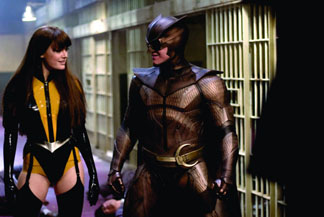Book vs. Movie
Watchmen
By Russ Bickerstaff
March 9, 2009
The unique aspects that film brings to a story are crucial here. What often gets overlooked when discussing film adaptations of comic books is how similar the two art forms are. Aside from being generally more commercially and critically accepted than comic books, films are very much like their less-respected siblings. Both comic books and films are dramatic, visually dynamic renderings of stories that were originally written in script format. Being a finished product, a film has more in common with comic books than it does with a more ephemeral dramatic art form like theatre. In this respect, it's a bit disingenuous to the pen and ink artist to praise a film adaptation of a comic book merely because it is a faithful rendering of that comic book. Unlike films based on text-based books, a comic book-based film has to do more to justify its existence than merely compellingly transfer a story to the screen. Being based on long-running monthly corporate-owned comic book series, most super hero films can at least rely on the fact that telling a story in a single film (or single film series) is distinctly different from telling a story that appears in smaller bits every month for a string of decades. Known much better as a single, 12-chapter graphic novel than it was as a 12 issue limited series, Watchmen is far more like a feature film than a traditional comic book series. The similar formats between a relatively short graphic novel and that of a feature film makes any film adaptation much more difficult to justify.
It is in that need to justify moving a story from one visual medium to another that Snyder's desire to remain true to the comic book ends up becoming a liability to the film. The film is 163 minutes long. The comic book is 384 pages long. Do the math and that means that the film covers something like two pages per minute. Regardless of how true you want to be to the comic book, you're going to be cutting scenes. This raises difficulties with the format of a feature film, which traditionally has a standard three-act plot structure — not a 12-chapter story that distinguishes itself in details. In remaining true to those scenes that are presented, the film comes across as being wholly uneven and doubtlessly very difficult to follow for people who haven't read the book at least once. The story that cascades across the screen ends up feeling profoundly disjointed.
Another problem with a desire to transfer some of the book's scenes directly to the screen is that it ends up amplifying what differences there ARE. This is particularly detrimental to a work of art that is so defined by its details. Snyder seems to have been so focused on making the film look like the book that he seems to have overlooked the importance of the acting ensemble — Malin Ackerman seems almost listless in her performance as Laurie Jupiter — lacking the anger and bitterness that makes her so interesting. Billy Crudup summons enough of Dr. Manhattan's sense of detachment, but he never manages to bring the character's loftier intellectual side to the screen. In the role of Adrian Veidt, Matthew Goode never seems quite charismatic to bring the image of a shining, godlike hero to the screen, which balances his performance out on the edge of being a pretty simple villain. The script doesn't allow him enough time onscreen to become the hero he needs to be to make the ending as much of a shock as it should be. Jackie Earle Haley actually does a pretty good job as Rorschach/Walter Kovacs, putting in a performance that gives the character an odd kind of young Clint Eastwood feel that adds to the mood of the film. Jeffrey Dean Morgan never seems quite bitter enough as the Comedian. Patrick Wilson seems to have the balance of Dan Drieberg down pretty well and even manages to carry a couple of really good moments. Due to the efforts of Haley and Wilson, the scenes between Rorschach and Nite Owl are the most compelling dramatically, which would have been fine if the film had focused more of its energy on the two characters. Instead, the whole thing feels like a rushed effort to get as much of the comic book into the film as possible.
Continued:
1
2
3
4




